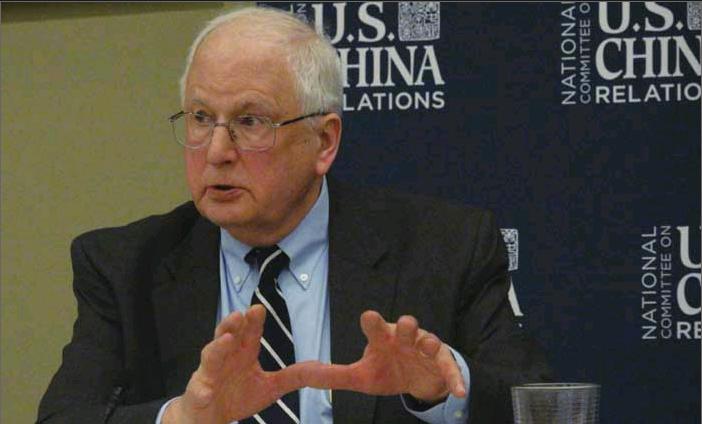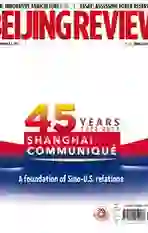A U.S.PERSPECTIVE ON ICEBREAKING EVENT
2017-03-29

Ambassador J. Stapleton Roy was born in Nanjing in 1935 to missionary parents. He served as U.S. Ambassador to the Peoples Republic of China from 1991-95. In the Cold War, from 1965 to 1974, he worked on Soviet Union affairs and was serving in Moscow when the Richard Nixon administration undertook the historic thawing of relations with China in 1971-72. He is founding director emeritus at the Kissinger Institute on China and the United States at the Wilson Center in Washington, D.C. Before the 45th anniversary of the publication of the Shanghai Communiqué, Beijing Review op-ed contributor Clifford Kiracofe interviewed Roy, who shared his personal experiences.
Beijing Review: How do you remember the international situation at the time of the Shanghai Communiqué?
Stapleton Roy: I was serving in Moscow when Dr. Henry Kissinger showed up in Beijing in July 1971. The Kissinger visit was the first manifestation that there had been a breakthrough in China-U.S. relations. The culmination of that breakthrough, of course, was the presidents visit to Beijing in February 1972. It was really the turning point in the Cold War.
The Cold War had three phases, you might say. The first phase was the enormous expansion of the Communist world after World War II. Through the 1950s, the external appearance was that the Soviet Union and China were friendly and allied. By the end of the 1950s, it was becoming visible to skilled observers that there were deep difficulties in the relationship. The second phase was the emergence of hostility between China and the Soviet Union. It was President Nixon who saw the possibility that that might create a potential for a breakthrough. But it took two years to translate that into action—partly because we did not know how to communicate with each other.
This was the lead up to the Shanghai Communiqué. This was, in a sense, un- precedented diplomacy and it worked. It is probable that no president except President Nixon would have had the strategic vision and the political courage to bring that about.
Looking back, it seems that Washingtons opening to China was not so easy to implement and wasnt it somewhat unusual in practice?
The Shanghai Communiqué was an unusual communiqué. The integrating element between China and the United States was our common concern about the Soviet Union but in virtually every other area we had divergent views. To make the visit possible there had to be the indication from the U.S. side that we were prepared to begin dealing with the Taiwan issue. But we could not resolve it and it was known that we would not be able to resolve it before the Nixon visit took place.
The two visits of Dr. Kissinger in July and October of 1971 were designed to explore and to make sure that there was an understanding. So the Shanghai Communiquétook the form of individual statements by China and the United States both on global issues and on the Taiwan issue. It was clear that the United States was prepared to move toward official relations with China but it was not clear how that would be done and what the compromises would be in terms of getting there. That was cleared up in the next two communiqués.
The announcement that we were going to establish diplomatic relations was revealed in December 1978, so that was six years later than the Shanghai Communiqué. It wasnt until 1973 that we reached agreement to open the liaison offices in Beijing and Washington. The establishment of diplomatic relations was on January 1, 1979, under the [Jimmy] Carter administration.
Many people dont know this but until January 1, 1979, we had no written agreements between us. We essentially had an unofficial representation office in Beijing as the Chinese had in Washington without any of the official protections of the Vienna Convention on diplomatic relations. We could not reach a written understanding on that because we did not have diplomatic relations.
So how did the United States side understand the Taiwan issue at the time of the Shanghai Communiqué?
The Shanghai Communiqué made possible the negotiations that led up to the agreements that enabled us to establish diplomatic relations. It pointed us in that direction.
The future of Taiwan is for the Chinese on both sides of the Taiwan Straits to resolve. The reason that we state that we dont oppose unification is because if we opposed unification we would be taking a position on what the outcome of negotiations between the two sides on the Taiwan Straits would be. It is for the Chinese on both sides of the Taiwan Straits to resolve that. We say we dont support unification and we dont support independence, thus we take no position. To support one or the other would be taking a position.
In light of the Shanghai Communiquéwhat can be said about the Trump administrations initial major blunder over Taiwan and the one-China policy?
The communiqués were not signed documents. That is why the questions raised about the one-China policy by President Trump were so deeply destabilizing to the relationship. As unsigned statements of administration views they did not automatically carry over from one administration to another. The communiqués provide the basis on which the diplomatic relations are based. If questions were raised about the one-China policy it would be raising questions about our ability to sustain our diplomatic relationship with China.
So, in my judgment, there was no possibility that the Chinese would agree to a new American ambassador in Beijing until that issue was clarified. They also would not have been prepared to negotiate many of the issues that the Trump administration has indicated it wants to negotiate with the Chinese as long as that issue is unsettled. If they did so, it would amount to letting the one-China policy be a bargaining chip in negotiating other issues. China made it quite clear before the inauguration that it was not prepared to bargain over the oneChina policy.
Given that the Shanghai Communiquéand the two others form the underlying basis of relations, would it seem that the Chinese reaction to the Trump administration actions was understandable and correct?
The practice in the past has been for each new administration to authoritatively affirm to the Chinese side that our China policy would be based on the three communiqués.
I think the Chinese were wise in that while they made their position clear they didnt stir up a big brouhaha over that question. The way the Chinese handled the matter actually was skillful. It was a devastating position for the new administration to take. China made it clear that the core question of one-China was not something subject to negotiation. They realized that the right approach was to privately work with the Trump administration in the period leading up to the inauguration and the period after to reach a resolution on the matter.
The administration statement on oneChina has removed the issue as a blocking element. Without knowing the details of how it was done, we dont know if there are any residual concerns on the Chinese side.
